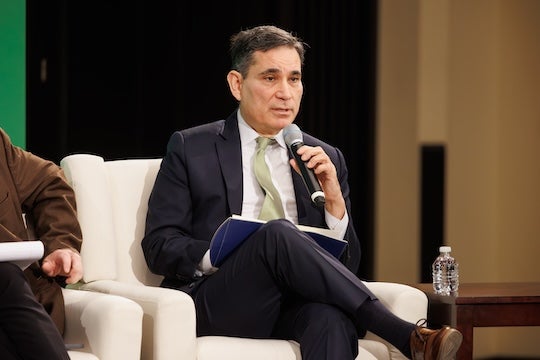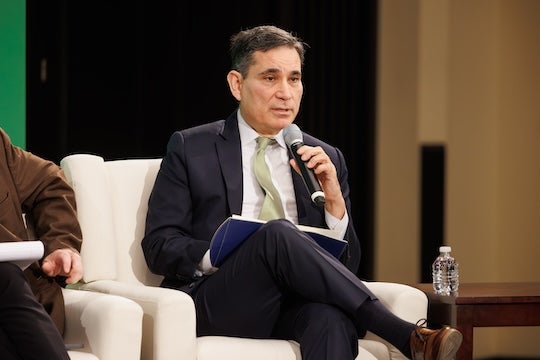The future of immigration and its relationship with this year’s election cycle was explored by experts at a May 14 event hosted by Rice University’s Baker Institute for Public Policy. Speakers from academia, media, legislature and immigration organizations surveyed how shifting policies have reshaped migration to the U.S.-Mexico border and discussed prospects for immigration reform.
Tony Payan, the Françoise and Edward Djerejian Fellow for Mexico Studies and director of the Baker Institute’s Center for the U.S. and Mexico, argues that immigration in the U.S. has always been politicized, especially around election cycles.

“The issue is not new,” he said in his welcome speech. “Mass migration is part of the human experience. Yesterday and today the ‘push’ factors are the same: economic hardship, violence, ungovernability, natural disasters, political oppression and so on. And the ‘pull’ factors are the same: opportunity, stability, prosperity, freedom and so on. For those of us who have studied immigration for a long time — its history, its evolution, its patterns, its many facets, its nuances, its goodness and its injustices — we understand that today the context is unique.”
Jeremy Robbins, the executive director of the American Immigration Council, said this is an “immigration election,” and the stakes couldn’t be higher.
“When we talk about the role of immigration in this election, it’s both the role it’s going to play in deciding this election and what it’s going to mean for the country going forward,” Robbins said.

He noted that candidates tend to run on immigration reform but then do not pass immigration reform and posed the question: How do we make this a policy issue instead of a political issue?
“When you do polling, when you talk to voters, when you do focus groups, there’s a lot of diversity in how people see this issue, but there’s a very, very common theme that drives why people are voting on immigration, and that’s about fear,” Robbins said. “It’s about anxiety, it’s about frustration and it’s about instability.”
Payan introduced the closing keynote speaker Mark Seitz, bishop of the Catholic Diocese of El Paso, and explained his work with some of the most vulnerable communities, including migrant families and refugees who chose El Paso/Ciudad Juarez as their passage to the U.S.
“Bishop Seitz believes that immigrants provide inestimable value to the communities where they choose to live and that parishes and community members should welcome them with compassion, love and solidarity,” Payan said.
The Bishop described how the Catholic Church has and does envision immigration.

“The church’s thought has always been influenced by its lived, pastoral realities on the ground,” Seitz said. “And right from the beginning of her history, the church was attending to the needs of the displaced. The network of monasteries established in the wake of the collapse of the Roman Empire were structured on the ethical imperative to welcome the stranger.”
He then examined how Texas’ policies are unfolding and what a “politics of exclusion” has produced.
“(Texas) has a storied and colorful history,” Seitz said. “It is vibrant, it is diverse, it is a place of faith. And as we approach the summer it is, as they say, ‘hotter than a fur coat in Marfa.’ But Texas is also the state that has become a laboratory for the most inhospitable and dehumanizing immigration policy. We are witnessing a new stage in the deadly militarization of our border with Mexico, a country with which we are not at war.”
View the entire discussion here.
The event was part of the Baker Institute Migration Initiative — a collaboration between the Center for Health and Biosciences, Center for the U.S. and Mexico and Edward P. Djerejian Center for the Middle East — that focuses on the economic, legal, health, social and environmental aspects of migration. It was co-presented by the Houston Chronicle.

